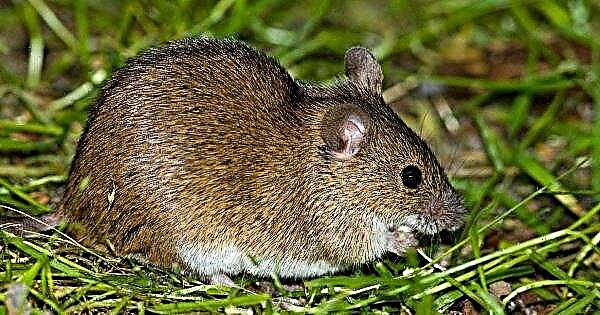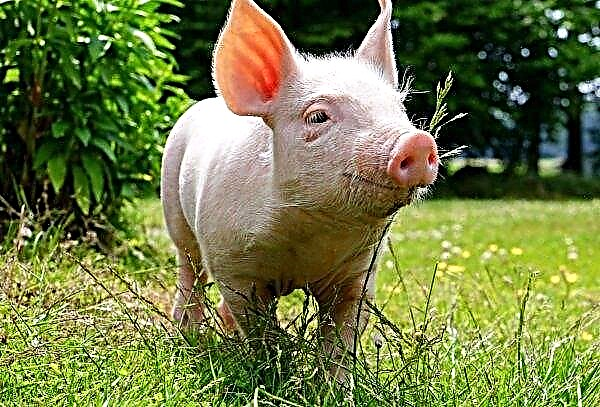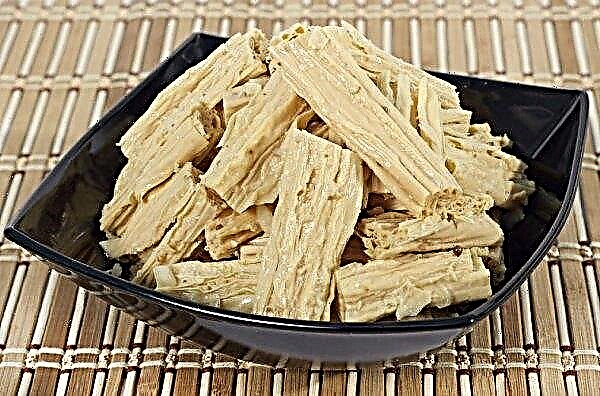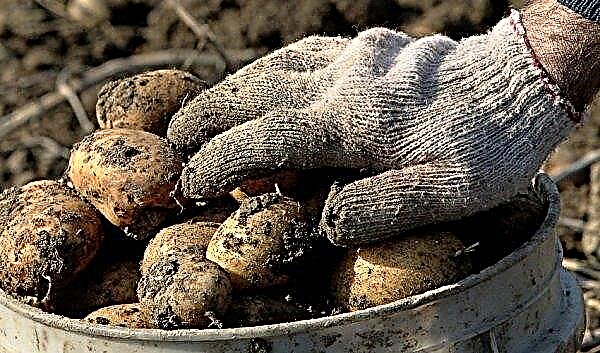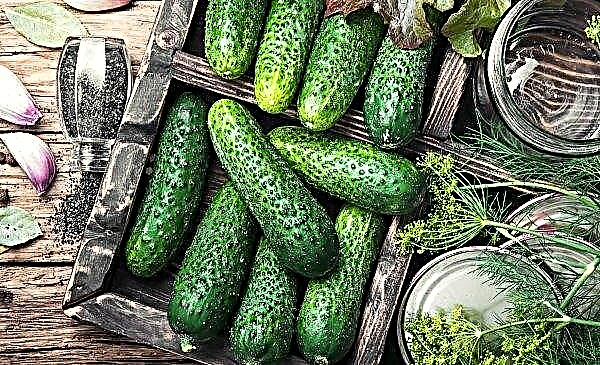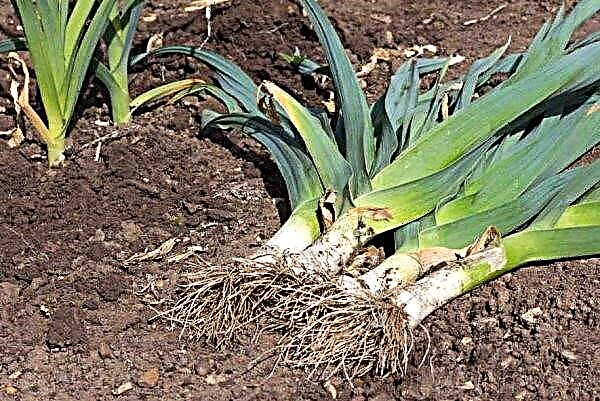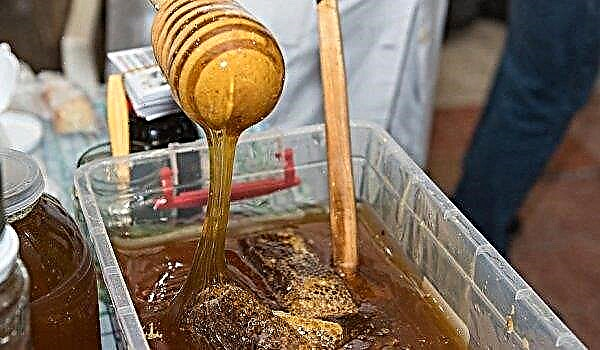One of the most popular spices in Asia, widely used in cooking and everyday life, is an ordinary ginger root. It has many useful properties, and its taste and aroma make it possible to give the finished dish or drink especially spicy notes. More details about the chemical composition of the spice, its useful and harmful properties, the peculiarities of the effect of the root on the human body and its use in folk medicine to promote health - further in the article.
Ginger Characteristic
The spicy root of this perennial herb not only has a characteristic piquant taste and persistent aroma, but also consists of many components useful to the human body. This allows you to use it not only as an oriental spice, but also as a medicine in order to prevent diseases and treat existing ailments.
Nutrition value of 100 grams of a product:Did you know? Ginger was known to mankind as early as 5000 years ago, and in Sanskrit it was called the “horned root”.
- calorie content - 80 kcal;
- proteins - 1.8 g;
- fats - 0.8 g;
- carbohydrates - 15.8 g;
- water - 79 g;
- dietary fiber - 2 g;
- ash - 0.8 g.

The unique chemical composition of the root includes many elements from the periodic table:
- vitamins - B1, B2, B4, B5, B6, B9, C, E, K, PP;
- macronutrients - potassium, calcium, magnesium, sodium, phosphorus;
- trace elements - iron, manganese, copper, selenium, zinc;
- monosaccharides and disaccharides;
- essential amino acids - arginine, valine, histidine, isoleucine, leucine, lysine, methionine, threonine, tryptophan, phenylalanine;
- essential amino acids - alanine, aspartic acid, glycine, glutamic acid, proline, serine, tyrosine, cysteine;
- phytosterols;
- saturated fatty acids - caprylic, lauric, myristic, palmitic, stearic;
- monounsaturated fatty acids - palmitoleic, oleic, gadoleic;
- polyunsaturated fatty acids - linoleic, linolenic, Omega-3, Omega-6.
Health benefits and harms
Due to its rich chemical composition, the rhizome is of great importance to humans and can be used as a medicine. But in the presence of diseases or malfunctions of certain organs of the human body, it is recommended that you consult a doctor before using the product to avoid harmful consequences.
- The list of useful root properties is presented below:
- Helps fight fatigue and depression
- increases the body's resistance to infections;
- eliminates edema, as it helps to remove excess fluid from the body;
- helps to get rid of pain in the stomach and intestines;
- relieves symptoms of toxicosis in early pregnancy;
- improves digestion and stimulates appetite;
- prevents the development of inflammatory processes in the body;
- possesses antioxidant properties, helping to fight cancer cells and parasites;
- contributes to the normalization of blood pressure;
- cleanses the body of toxins;
- normalizes hormonal levels;
- effectively fights aging, improving skin condition;
- beneficial effect on hair, giving it a thick and healthy shine;
- contributes to weight loss, as it contains few calories;
- improves sexual desire;
- stimulates blood circulation;
- improves concentration and memory.
Important! The most useful is precisely fresh, not dried ginger root - it contains a maximum of vitamins.
- When using ginger, care must be taken, since in some cases this product is contraindicated for use, causing negative side effects:
- creates an additional load on the liver, enhancing its secretory function;
- irritates the mucous membrane of the stomach and intestines, which can cause the appearance of pain;
- increases blood pressure, creating an additional burden on the heart;
- with an overdose, it can cause digestive disorders, accompanied by diarrhea, nausea and vomiting;
- may cause an allergic reaction, especially in children.
The use of ginger for medicinal purposes
Ginger is often used in folk medicine for the treatment and prevention of various diseases. Due to its usefulness, this root has a positive effect on the functioning of internal organs and their systems, and therefore helps to prevent disturbances in their work. The spice is mainly used for the preparation of medicinal drinks, in which, in addition to the main ingredient, other spices and products are added.
You can make refreshing lemonade from ginger by adding cranberries and lime to it, as well as adding root to milk. But before treating any disease with ginger, you need to consult a doctor so as not to harm your body.
How does it affect the body
Ginger has a complex effect on various systems of human organs, supplying them with necessary vitamins and beneficial substances. As a result of this, an improvement in the state of health and well-being is observed.
- Features of the effect of the root on the body are listed below:
- improves the digestive system, helping to get rid of eating disorders and a feeling of heaviness in the stomach;
- eliminates skin problems, contributing to the disappearance of acne, rash;
- normalizes the functioning of the nervous system, providing a calming effect and improving blood flow to the brain;
- beneficial effect on the cardiovascular system, as it improves blood flow, preventing the formation of blood clots in blood vessels;
- strengthens the musculoskeletal system - the root helps prevent wear on the joints, improves muscle tone;
- positively affects the genitourinary system - spice reduces pain during menstruation in women, and also increases potency in men;
- stimulates the endocrine system, leading to normal hormonal levels.
Does bleeding cause
In moderate amounts, the root is useful for the human body, but in some cases it can not be consumed so as not to provoke bleeding. This is due to the fact that ginger dilutes the blood and stimulates the blood circulation.
- This can cause hemorrhages in such cases:
- an ulcer or gastritis;
- acute hemorrhoids;
- tumors on the mucous membranes of the digestive system;
- myocardial infarction;
- second half of pregnancy;
- the presence of open wounds on the surface of the skin.
Healing properties
Ginger is one of the main ingredients in traditional medicine. On the Internet you can find many step-by-step recipes with photos, according to which various decoctions and medicinal potions are prepared from the root, gaining many positive reviews about their effectiveness. In addition, drinks and mixtures with this burning spice help prevent the development of certain diseases. But to achieve the desired effect, you need to choose a root of good quality and know how much product to use to prepare the product.
The healing properties of the root are used to treat and prevent such diseases:
- food poisoning - to relieve spasms in the intestines and fight against vomiting, boil 100 g of a mixture of wormwood, hoof root and ginger in 1 liter of boiling water (the ingredients are mixed in a ratio of 2: 2: 3), and then take the prepared broth of 200 ml every 60 minutes before eating;
- angina - to treat a throat, you can chew a small piece of the root daily or rinse with a ginger decoction prepared from a pinch of dry spice and 200 ml of water;
- asthma - from 250 g of crushed spices and 500 ml of alcohol, a therapeutic tincture is prepared, taking it for 1 tsp. 2 times a day;
- colds, SARS, flu - a small piece of grated root is poured with a glass of boiling water, adding a slice of lemon and honey, and the prepared homemade tea is consumed throughout the day;
- cough, bronchitis - to facilitate the discharge of sputum, a mixture of 1 teaspoon of lemon or lime juice and 1 teaspoon of ginger juice is prepared, adding the same amount of honey and 100 ml of boiling water to it;
- hemorrhoids - mix 1 teaspoon of aloe juice and a pinch of grated ginger, using the prepared preparation 2 times a day;
- allergy - to get rid of the symptoms, prepare a tincture of 1 liter of vodka, 10 g of ginger, 1 hour of motherwort root, 5 granules of black pepper and 3 buds of cloves, taking it in half a teaspoon 2 times a day;
- hypotension - to normalize the level of blood pressure, it is recommended to drink tea from 2 tbsp. During the day grated ginger and 1 liter of boiling water, adding lemon and honey to it to taste;
- joint diseases (arthritis, rheumatism) - compresses are applied to problem areas from a mixture of 2 parts of ground root, 0.5 parts of ground hot pepper, a pinch of turmeric and several tablespoons of sesame oil;
- liver disease - to prevent their occurrence, use an infusion of 1 tbsp. water and 20 g of crushed root, drinking 10 drops of the product every morning 20 minutes before eating;
- skin wounds and scratches - A cotton compress impregnated with ginger juice diluted with water is applied to the damaged areas;
- prostatitis in men - Pour 10 g of grated root with 100 ml of vodka and insist for 14 days, and then consume 10 drops of the drug 3 times a day;
- skin aging - to improve complexion and smooth wrinkles, a mask is applied to the skin for 15–20 minutes, which is prepared from a small piece of chopped ginger, 2 tbsp. honey, 1 tbsp. spinach, 0.3 tbsp. mint and pieces of mashed banana.
Important! The daily norm of fresh ginger for an adult is about 10 g.
At what age can children be given
The root is very useful for the body of children, but it is recommended to give it to the child with caution and at the right time, observing the reaction of the child's body. It is possible to introduce ginger in the children's diet after the child is 2 years old. Familiarity with the product must begin with a very small portion, and in case of food allergies immediately stop taking.
The main uses of ginger for children are listed below:
- It is part of cough and cold syrups, helping to mask the bitter taste of the medicine:
- It is a component of baby food, providing a strengthening effect on the immune system;
- it is used during the preparation of decoctions for inhalation, as it promotes the discharge of sputum from the lungs and mucus from the nose, reducing a runny nose and cough;
- recommended for use during psychomotor retardation;
- used to normalize intestinal microflora;
- It is used as an effective strengthening agent during epidemics of influenza.
Did you know? In the USA, England and Australia, ginger root is used to make alcoholic beverages - beer and ale.
Contraindications
Despite the long list of positive properties of the root, in some cases it is forbidden to eat, in order to avoid the danger of exacerbation of diseases and worsening of general well-being.
- The main contraindications to the use of the product are:
- individual intolerance - causes a severe food allergy in the form of a rash and digestive upset;
- increased body temperature - the root can cause an even stronger fever, as it has a warming effect on the body;
- chronic liver diseases (hepatitis, cirrhosis) - the use of ginger creates an additional burden on this organ, causing an exacerbation of the disease;
- urolithiasis - the product has a diuretic effect and can cause the movement of stones along the bile ducts;
- the second half of pregnancy - the use of ginger can provoke bleeding or premature birth;
- lactation period in women - the product penetrates into breast milk, changing its taste and smell, which can cause the baby to refuse to breast;
- exacerbation of hypertension - the use of the root will exacerbate the course of the disease as a result of increased blood pressure;
- bleeding of various nature - the product stimulates blood circulation, which can aggravate the condition of the patient;
- diseases of the stomach (gastritis, ulcer, colitis) - burning seasoning is a strong irritant for the inflamed mucous membrane of the digestive system, therefore it causes severe pain;
- children's age up to 3 years - the root is a strong allergen for children.
Important! It is not recommended to use ginger at night, as it tones the body and causes insomnia.
Ginger is a well-known and very valuable spice, which, if used properly, can have a healing effect on the body. Using the information presented in the article about the benefits and harms of the root, it can be used to treat and prevent many diseases, as well as to enrich the body with vitamins and strengthen immunity.

